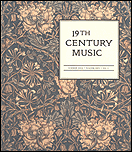
NINETEENTH CENTURY MUSIC
Scope & Guideline
Diving into the Rich Tapestry of 19th Century Sound
Introduction
Aims and Scopes
- Exploration of Musical Identity and Subjectivity:
The journal emphasizes the study of how musical identity is shaped by cultural, social, and historical factors, particularly through the lens of composers like Mahler and Beethoven. - Interdisciplinary Approaches to Musicology:
NINETEENTH CENTURY MUSIC incorporates perspectives from literature, philosophy, and cultural studies to enrich the understanding of musical works and their impact. - Analysis of Historical and Cultural Contexts:
The journal frequently contextualizes musical compositions within their historical settings, examining how societal norms and events influence the music of the period. - Focus on Underrepresented Voices and Narratives:
There is a consistent effort to highlight marginalized figures and perspectives in music history, including explorations of race, gender, and national identity. - Critical Examination of Musical Aesthetics and Theory:
The journal engages with theoretical frameworks and aesthetic discussions, analyzing concepts such as the sublime and ineffability in music.
Trending and Emerging
- Intersection of Music and Identity:
A growing focus on how music reflects and constructs identities, particularly in relation to gender, race, and ethnicity, as seen in papers addressing Jewish masculinity and black musicality. - The Role of Emotion and the Sublime in Music:
Emerging discussions surrounding the emotional dimensions of music, particularly the concept of the sublime and its implications in composers' works. - Cultural Memory and Musical Reception:
An increasing interest in how music is remembered, reinterpreted, and received across generations, as evidenced by analyses of works' afterlives. - Environmental and Societal Impact of Music:
Recent articles explore the intersections of music with environmental themes and societal issues, reflecting a contemporary interest in music's role in addressing ecological concerns. - Reinterpretation of Historical Narratives:
There is a trend towards reexamining historical narratives and exploring lesser-known figures and events, indicating a shift towards inclusivity in music history.
Declining or Waning
- Traditional Musicological Analysis:
There appears to be a waning interest in purely traditional musicological approaches that focus solely on technical analysis of compositions without contextual relevance. - Biographical Studies of Composers:
While biographies of major composers have been a staple in music scholarship, recent trends indicate a reduced focus on this genre, favoring broader cultural and thematic studies instead. - Eurocentric Perspectives on Music:
The journal has increasingly moved away from Eurocentric narratives, indicating a decline in themes that do not incorporate global perspectives on music. - Focus on Canonical Repertoire:
There is a noticeable decrease in discussions centered around the Western classical canon, as more attention is given to diverse musical forms and non-canonical works. - Romanticism as a Central Theme:
While Romanticism has been a central theme in past publications, its dominance is fading as the journal explores more varied genres and historical contexts.
Similar Journals
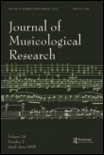
JOURNAL OF MUSICOLOGICAL RESEARCH
Decoding the Language of Music through ResearchJOURNAL OF MUSICOLOGICAL RESEARCH, published by Taylor & Francis Ltd, is an esteemed platform that delves into the field of musicology, contributing to the ongoing dialogue in music research and scholarship since its establishment in 1979. With an ISSN of 0141-1896 and an E-ISSN of 1547-7304, this journal serves as a vital resource for researchers, professionals, and students, offering insights into diverse musicological topics. Although currently categorized in Q4 in Music with Scopus rankings placing it at #110 out of 180 in the Arts and Humanities field, its commitment to excellence and broader discourses in music studies is evident. The journal does not have Open Access options, yet it provides accessible content through reputable academic channels, fostering scholarly exchanges within the community. It aims to publish high-quality research that advances understanding of musical practices and cultural implications, making it a critical resource for those passionate about music and its myriad influences.
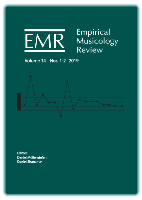
Empirical Musicology Review
Exploring the Harmony of Empirical Research in MusicologyEmpirical Musicology Review is a pioneering journal in the field of musicology, published by the Ohio State University School of Music. Established as an open access journal since 2006, it aims to foster interdisciplinary research by providing a platform for scholars to disseminate empirical studies and analyses related to music. With ISSN 1559-5749, this journal plays a crucial role in expanding the understanding of music through methodological rigor and innovative practices, catering to researchers, professionals, and students alike. By promoting the accessibility of high-quality research, Empirical Musicology Review significantly contributes to the evolving landscape of music studies and enhances the global dialogue surrounding music's theoretical and practical dimensions. The journal's commitment to open access ensures that its valuable insights reach a broad audience, encouraging further exploration and collaboration within the musicology community.
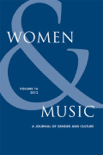
Women and Music-A Journal of Gender and Culture
Unveiling the Rhythm of Women's Experiences in MusicWomen and Music: A Journal of Gender and Culture is a pioneering academic journal published by University of Nebraska Press, focusing on the intersection of gender and music. With a commitment to exploring issues pertinent to women and music in a range of cultural contexts, this journal provides a critical platform for scholars, musicians, and educators to share research that enriches our understanding of gender dynamics within the music industry and music's role in society. While currently not an open-access journal, it aims to make significant contributions to gender studies, cultural studies, and musicology, attracting a dedicated readership from various backgrounds. The journal is essential for those interested in feminist musicology and gender representation in the arts, fostering discourse that challenges traditional narratives and promotes inclusive scholarship. By bringing together diverse perspectives and innovative research, Women and Music continues to push boundaries and foster important conversations within both academic and artistic communities.

Musicologica Brunensia
Celebrating the Rich Tapestry of Musical KnowledgeMusicologica Brunensia, an esteemed journal published by Masaryk University, Faculty of Arts, serves as a significant platform for the dissemination of knowledge in the field of musicology. Based in the Czech Republic, this Open Access journal has been facilitating scholarly communication since 2009, allowing unrestricted access to its rich array of research articles. With an ISSN of 1212-0391 and an E-ISSN of 2336-436X, Musicologica Brunensia proudly holds a Q3 ranking in the Music category as of 2023, reflecting its dedication to advancing research in the arts and humanities, particularly music. The journal accepts contributions spanning diverse topics within music studies, fostering interdisciplinary dialogue among researchers, professionals, and students alike. Located at Arne Novaka 1, Brno, 60200, Czech Republic, Musicologica Brunensia is poised to continue its journey of promoting innovative scholarship in musicology until 2024 and beyond, making it a valuable resource for anyone passionate about the field.
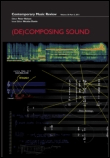
Contemporary Music Review
Exploring the Soundscape of ModernityContemporary Music Review, published by Routledge Journals, Taylor & Francis Ltd, is a leading academic journal in the field of music, renowned for its critical engagement with current practices and theories in contemporary music. Established in the United Kingdom, the journal has evolved since its inception in 1984 and is noted for its significant contributions to a rich understanding of modern musical landscapes. With an impressive Scopus rank of #45 out of 180 in the Arts and Humanities category, placing it in the 75th percentile, it showcases a diverse range of articles addressing innovative research and artistic practices, making it essential reading for researchers, professionals, and students alike. While it operates under a subscription model, the journal prioritizes wide access to vital scholarly work, aiming to broaden discourse and foster a deeper understanding of contemporary music's role in society. The impact factor of the journal adds further weight to its authority, underlining its place in the Q2 category of music journals as of 2023. Engage with the Contemporary Music Review to stay at the forefront of discussions and advancements within the vibrant field of contemporary music.
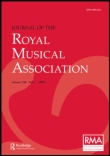
JOURNAL OF THE ROYAL MUSICAL ASSOCIATION
Celebrating the art and science of music.JOURNAL OF THE ROYAL MUSICAL ASSOCIATION, published by Cambridge University Press, stands as a significant repository for innovative research and scholarly discourse within the field of music studies. Recognized for its contributions to the understanding of musical practices, theory, and history, this esteemed journal offers a platform for academics and researchers to disseminate their findings to a broad audience. With an ISSN of 0269-0403 and E-ISSN of 1471-6933, the journal has maintained a notable presence since its inception, merging insights from both traditional and contemporary musicology. It currently occupies a Q4 ranking in Music within the Scopus database, reflecting its inclusion within the arts and humanities landscape. While the journal traditionally operates under subscription access, its continuing commitment to advancing music scholarship ensures that it remains an essential resource for students, scholars, and practitioners alike, fostering greater understanding and appreciation of musical artistry from 1987 to the current era.

Music Theory Online
Elevating Musical Scholarship: Engage with Cutting-Edge ResearchMusic Theory Online is a distinguished journal within the field of music, published by the Société for Music Theory. With an ISSN of 1067-3040, this open access journal has been providing valuable insights and scholarly contributions since 1993. Based in the United States, at the University of Chicago, Department of Music, it serves as a platform for rigorous research and discourse in music theory. The journal has achieved significant recognition, attaining a Q1 ranking within its category for 2023 and positioning itself at the 26th percentile among 180 journals in the Arts and Humanities, demonstrating its impact on the field. Facilitating access to cutting-edge studies, Music Theory Online aims to engage researchers, educators, and students by fostering a deeper understanding of music theory concepts and methodologies, thereby contributing to the advancement of musical scholarship.
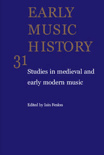
EARLY MUSIC HISTORY
Advancing Scholarship in Early MusicEARLY MUSIC HISTORY is an esteemed academic journal published by Cambridge University Press, specializing in the rich and diverse field of early music, providing a vital platform for research and discourse since its inception. With an ISSN of 0261-1279 and an E-ISSN of 1474-0559, the journal operates from its headquarters in Cambridge, United Kingdom. Known for its scholarly rigor, EARLY MUSIC HISTORY is ranked within the Q2 category in Music, illustrating its significant contribution to the field. The journal covers a broad time frame, examining musical developments from the medieval to the early modern period, and features articles that seek to illuminate historical contexts and contemporary implications of early music practices. Despite lacking the Open Access option, it remains a valued resource for researchers and professionals seeking to advance their understanding of this dynamic area of study. The journal not only fosters a deeper appreciation of early music history but also positions itself as a pivotal contributor to ongoing academic dialogue, making it essential reading for scholars in the arts and humanities.
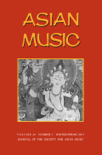
ASIAN MUSIC
Fostering Interdisciplinary Insights into Asian Music.ASIAN MUSIC is a distinguished academic journal published by University of Texas Press, focusing on the rich and diverse musical traditions of Asia. With an ISSN of 0044-9202 and an E-ISSN of 1553-5630, this journal serves as a key platform for interdisciplinary research that encompasses musicology, ethnomusicology, and cultural studies related to Asian music practices. While ASIAN MUSIC is not an open-access journal, it provides valuable insights and scholarly articles that contribute significantly to the understanding of music’s role within Asian cultures. The journal originally covered works from 2002 to 2010 and has a reputation for fostering discussions that celebrate the intricacies of sound, performance, and society. Targeting researchers, professionals, and students alike, ASIAN MUSIC stands as a crucial resource for those engaged in the study of music in its multifaceted context.
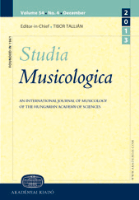
Studia Musicologica
Fostering Insightful Research in the World of MusicStudia Musicologica, published by AKADEMIAI KIADO ZRT, stands as a leading journal in the field of musicology, dedicated to the exploration and analysis of music across diverse cultures and historical contexts. With its ISSN 1788-6244 and E-ISSN 1789-2422, this journal provides an essential platform for disseminating high-quality research and critical analyses, thereby contributing significantly to scholarly discourse in music studies. Although it operates on a traditional access model, its rigor and foundational contributions ensure that it remains invaluable for researchers, professionals, and students alike. Situated in the heart of Hungary, Studia Musicologica engages with a broad spectrum of topics including music theory, ethnomusicology, and music history, fostering a deeper understanding of music's multifaceted role in society. This makes it an essential resource for anyone interested in advancing their research or professional practice within the expansive field of musicology.